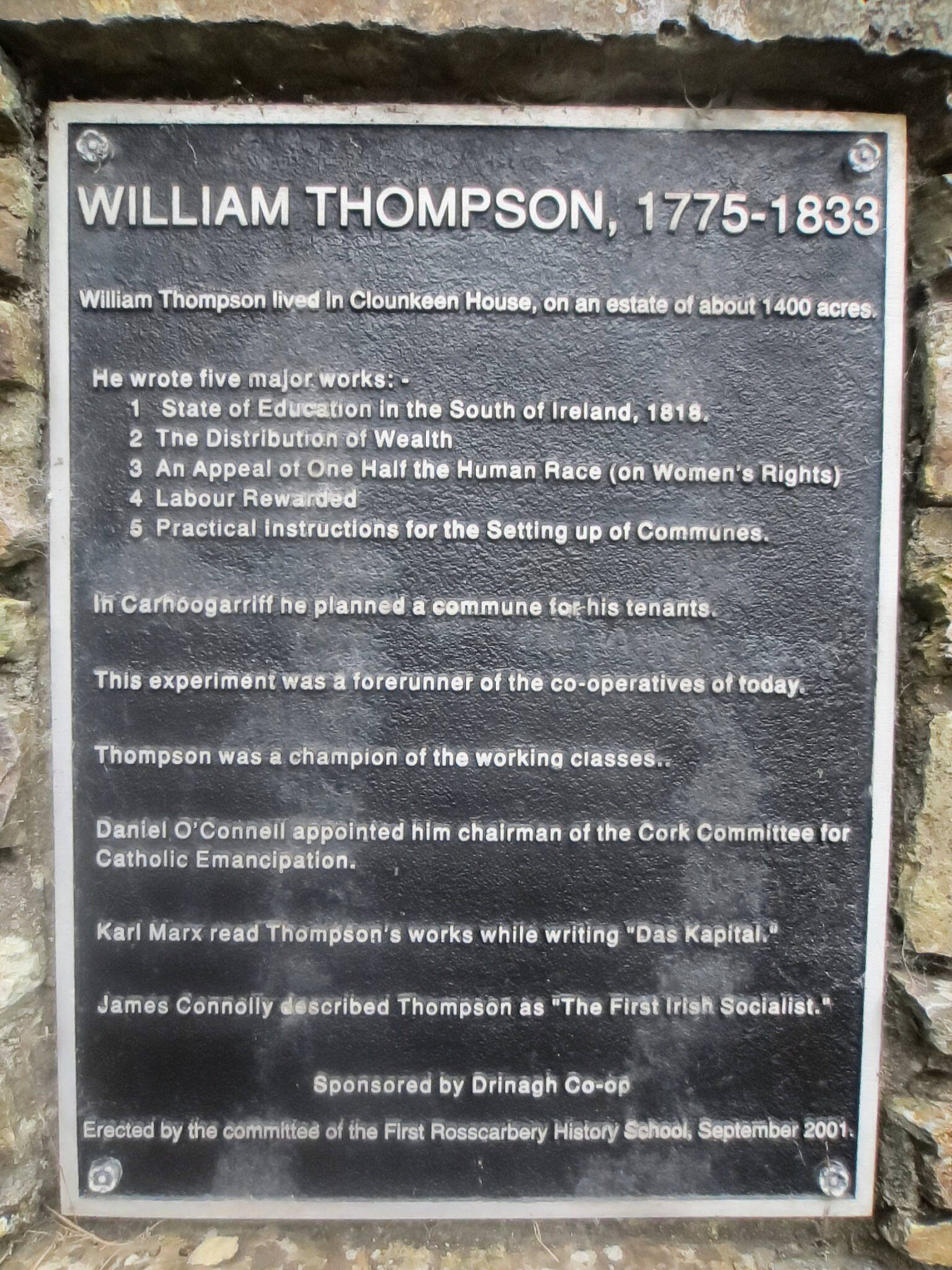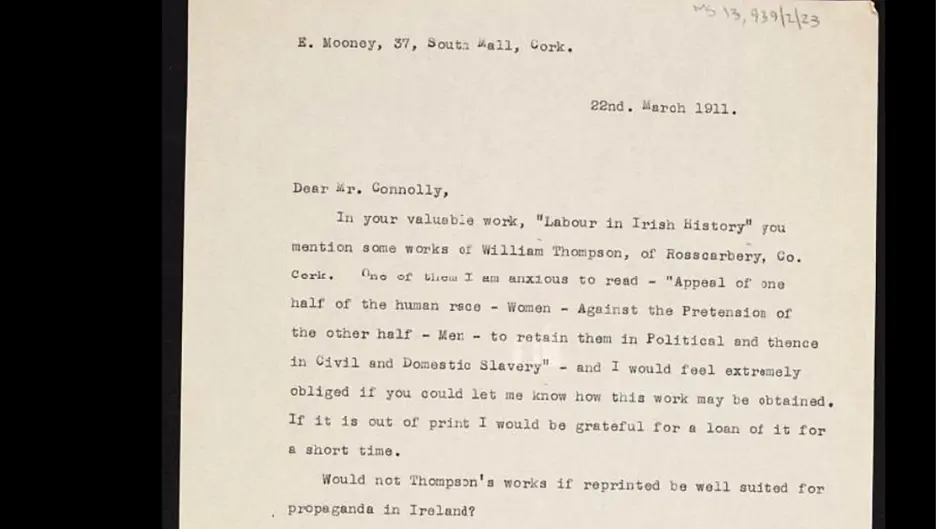The Carhoogarriff resident, who attempted to foster a utopian society in West Cork, was born 250 years ago this year.
BY PAULINE MURPHY
International Workers’ Day, Mayday, Labour Day: May 1st has many monikers, but is in all countries (where it is recognised) a celebration of the working class and workers’ rights.
While in Ireland the name of James Connolly is the most famous association with the early labour movement, Connolly himself looked to Cork and described one William Thompson, a West Cork man, as ‘Ireland’s first socialist’.
He also dedicated a whole chapter in his book Labour in Irish History, to Thompson.
William Thompson was born in Cork City on June 30th 1775, and so this year marks the 250th anniversary of his birth.
He was the son of a wealthy merchant, landowner and Lord Mayor, John Thompson, and when William turned 39, his father died and he inherited the family fortune.
This included Clounkeen House, a 1,400 acre estate at Carhoogarriff, about three miles from Glandore, which offered Thompson the opportunity to create what he had always preached: a utopian society.
Thompson had a great thirst for knowledge and devoured the works of 18th century thinkers; he also worshipped the work of the philosopher Jeremy Bentham. Going against his own social class, he supported the idea of an equal society built on the pursuit of happiness for all.
He was also a supporter of women’s rights, animal rights, and was a vegetarian, all ideals which were considered very radical for the time.
 The plaque erected by the First Rosscarbery History School in 2001.
The plaque erected by the First Rosscarbery History School in 2001.Thompson met his hero Bentham in 1822, and impressed the English thinker so much, that he was asked to extend his visit to a five-month stay at Bentham’s London home.
In 1824 Thompson published his best known work, An Inquiry into the Distribution of Wealth.
When the German philosopher Karl Marx visited Manchester in 1845, he spent a lot of time in the library reading the works of past thinkers, including this work of Thompson’s. Marx drilled into a deeper thinking of the concept of ‘surplus value’ and expanded these influences in his own seminal work, Das Capital.
In An Inquiry into the Distribution of Wealth, Thompson championed the distribution of wealth and laid the early foundations for a co-operative system.
At his West Cork estate, Thompson set out plans for a co-operative community and tenants at Carhoogarriff, overlooking Glandore harbour, were positively impacted by their radical landlord.
He reduced their rents, and also offered allotments ranging from three to 10 acres.
For decades after his death, Thompson was still highly spoken of by those in Glandore.
In the 1876 publication, Daniel Donovan’s Sketches in Carbery, the author dedicated a chapter to the radical landlord, describing him as a man with ‘peculiar habits, strange creed and extraordinary theories.’
In a land blighted with absentee landlords, Thompson made a point of not being another one.
He ordered the construction of a tower on a hill overlooking his estate, locally known as Thompson’s Turret, and he was known to watch over his estate from it.
Thompson introduced new farming techniques to his tenants, who gladly accepted the improvements but they were often left perplexed by their landlord’s lifestyle. Some called him a wizard due to the scientific experiments he conducted, and the fact that he spurned vices such as smoking and drinking. He also had a distrust of organised religion, and lived solely on a diet of vegetables and honey.
Thompson was particularly dedicated to honey-making at his Glandore estate, and it was known to be the best honey in the area. One time Thompson spotted a field mouse stuck in a honey pot.
Without hesitation, he rescued the mouse from the pot and licked the honey from it, before setting the mouse free once more.
The utopian philosopher was never seen without his dandy walking cane, which he had decorated with a French tricolour.
As a young man he had spent some time in France, where the ideals of the revolution – liberty, equality, and fraternity - instilled in him a desire for the same in his own homeland.
Another ideal Thompson cherished was women’s rights, and his greatest collaborator was one of Ireland’s earliest feminists, Anna Doyle Wheeler.
Much like Thompson, she led an intriguing life. Born in Tipperary and the daughter of a Church of Ireland clergyman, Ms Doyle was married at the age of 15 to Francis Massy Wheeler. The marriage lasted 12 years, but was marred by Mr Wheeler’s alcoholism.
Their union produced six children but tragically, only two survived.
In 1825 Wheeler and Thompson co-wrote An Appeal of One Half of the Human Race.
The philosophical duo had become close friends, and both shared the same ideals of social and gender equality.
Thompson shared Wheeler’s condemnation of the institution of marriage, seeing it as the domination of the male over the female, akin to the relationship between employer and worker.
William Thompson’s health declined in 1833 and he died that year at his West Cork residence, on March 28th and at the age of 57.
Unfortunately, his plan for a utopian society in West Cork was left unfinished.
Before he became ill, Thompson was in the process of building a school for the children of his tenants as well as new cottages with generous allotments.
Thompson, who never married or had any heirs, left the majority of his estate to the co-operative movement and this caused friction with his siblings, who contested the will.
The aggrieved siblings claimed their brother was insane, and the case dragged on for 25 years.
It was the longest contest of a will in Irish legal history, and by the end of it all, the legal costs had eaten into the estate and there was nothing left.
A nephew of Thompson was tasked with organising his funeral, and to the utter shock of locals, he gave his atheist uncle a Christian burial in Drombeg cemetery.
Following an outcry by those who truly knew him, the remains of Thompson were dug up and his wishes were fulfilled, with his body ultimately donated to science.
During his lifetime, Thompson was considered by many to be an odd character due to his radical stance on social and economic equality.
His support of feminism and stance against organised religion cast him as an eccentric radical, or as his own family declared him, insane.
The Thompson estate with its cottages, allotments and famous Thompson turret are no more.
Not a trace can be found of the once-intended utopia envisaged by William Thompson, but you will find a plaque erected in 2001 by the Rosscarbery History School and sponsored by Drinagh Co-Op, which describes Thompson as a ‘champion of the working class’.










